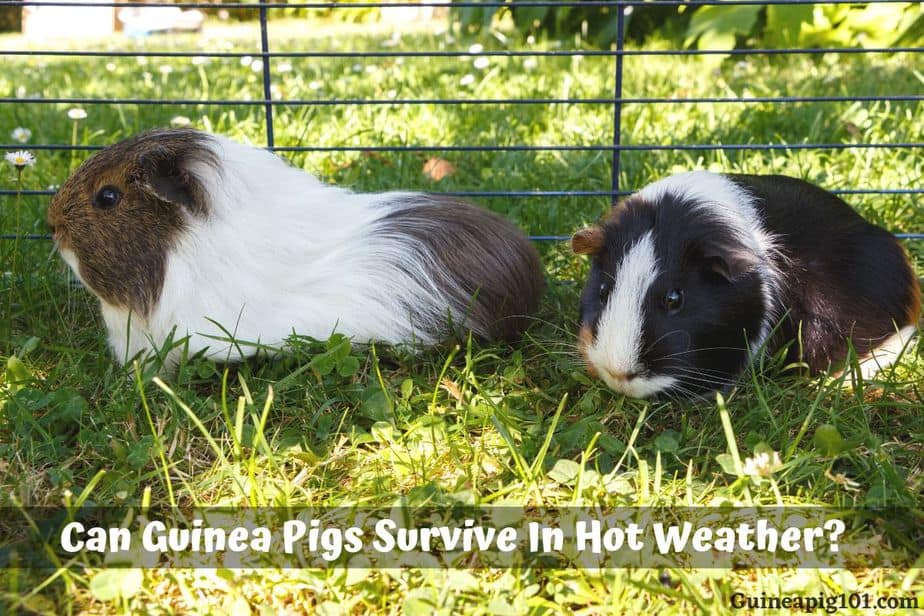Guinea pigs do not have a well organized cooling system in their body. They even have dense fur coats. So, as a concerned guinea pig owner, you may wonder can guinea pigs survive in hot weather conditions? So, I decided to do some research, and here is what I have learned.
Guinea pigs cannot tolerate heat well and are likely to pass away from heatstroke. Guinea pigs can get overheated at a temperature of 80 degrees Fahrenheit or above. Even those guinea pigs who are accustomed to outdoor living can become stressed during hot weather conditions.
As guinea pigs do not have any sweat glands, it prevents them from releasing excess heat from the body.
Guinea pigs are only allowed to let out excess heat through their long ears and panting. But these systems do not show any effective results.
We will advise you to keep your guinea pigs indoors so that they can remain cool. In addition to this, you should also provide them with ample fresh water and vegetables at all times.
What is the hottest temperature a guinea pig can live in?
Guinea pigs are not capable of tolerating heat more than they are of the cold. There are high chances that they may pass away from heatstroke, especially if the humidity is high and the air temperature is more than 26 degrees Celsius.
Those guinea pigs who have lived indoors, especially in air-conditioned spaces, are less likely to survive outdoors than guinea pigs accustomed to outdoor living.
If the air temperature reaches 80 degrees F, it is enough to cause severe physical stress to guinea pigs. If you notice that your guinea pigs are showing signs of overheating, they will need immediate medical attention.
You should provide water to your guinea pigs during the hot summer, as it is the most valuable resource that can give relief to your guinea pigs at the time of hot summer. Always make sure that your guinea pigs have access to fresh drinking water at all times.
You should always keep an eye in your guinea pig’s water bottle or water bowl as it evaporates quickly in the summer.
Guinea pigs also don’t enjoy drinking warm water so replacing the bottle or refilling it with fresh and cool water is vital for keeping them hydrated.
Do guinea pigs like hot weather?
No, guinea pigs do not like hot weather, as warm air temperature can lead to several significant issues in your guinea pigs like heat strokes.
Guinea pigs enjoy cold weather more as compared to the hot summer.
We recommend that you not let your guinea pigs out during hot summer as they are not capable of handling the heat.
You should always keep your guinea pigs in a temperature between 16-24 degrees celsius.
Why can’t guinea pigs tolerate heat
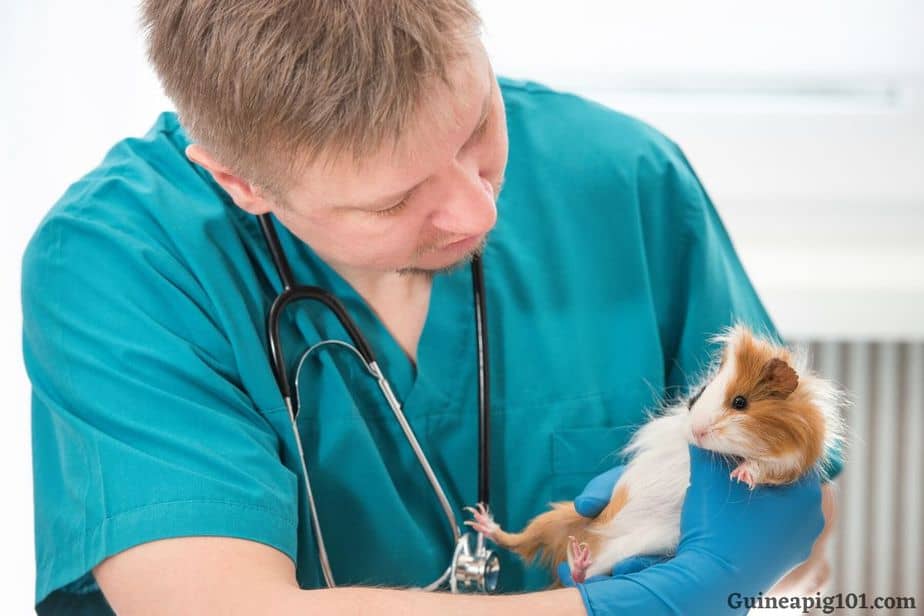
Guinea pigs have an average body temperature of around 102 to 103 degrees Fahrenheit. They cool themselves through respiration, and their ears play a crucial role in thermoregulation.
Guinea pigs lose 80% of the heat via evaporation of water during heating. They are not able to tolerate heat because of the following reasons:
- Guinea pigs have dense fur coats.
- They almost have no sweat glands.
- Guinea pigs are not able to pant effectively to release heat, unlike other animals.
- When dehydrated or overheated, they do not like to drink water.
Guinea pigs have a high chance of becoming stressed by extreme environmental temperatures. Although guinea pigs hold a decent system for thermoregulation, high temperatures can be especially hard on them.
Do guinea pigs sweat?
Guinea pig’s capability to sweat is strictly limited due to the location and small size of its sweat glands.
Guinea pigs have sweat glands inside their mouth, so if you see them panting, they are overheated and are trying to cool themselves down.
Other signs of overheating in guinea pigs include lethargy, drooling, less water intake, loss of coordination, and weakness.
Even though guinea pigs can pant, they do not pant well. Panting in guinea pigs is not an effective means of cooling down themselves.
Those guinea pigs who are suffering from severe dehydration will stop panting and may experience convulsions. That can also lead further to coma and life-threatening.
Do guinea pigs eat less in hot weather?
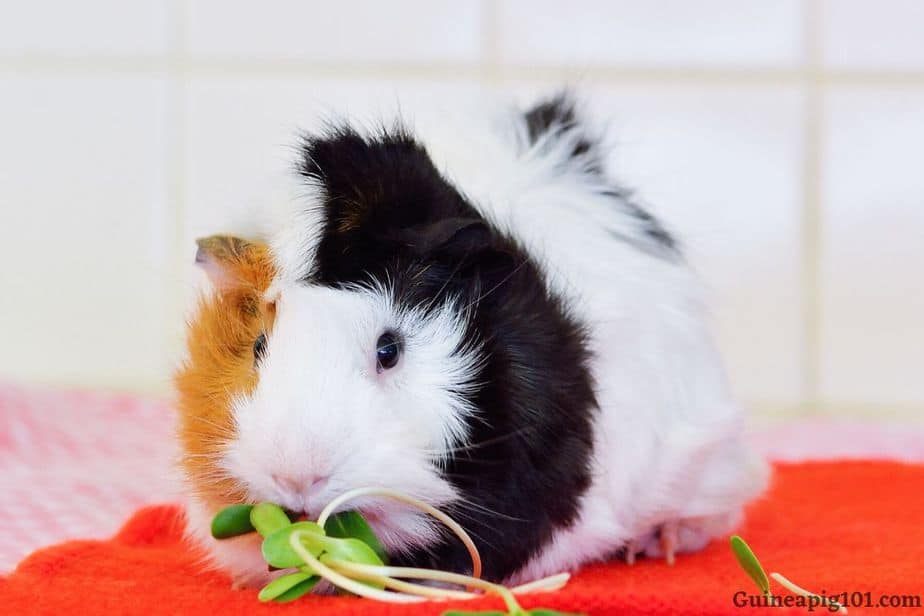
No, guinea pigs eating has no relationship with the weather. If you notice that your guinea pigs are eating less, then it may be due to Overheat.
There can be even many other reasons for your guinea pigs to eat less like dental problems and digestive problems.
We would suggest you keep your guinea pig in moderate temperature as they are not good at tolerating heat.
How do you keep guinea pigs cool in hot weather?
There are several ways to keep your guinea pigs cool in hot weather. Let us discuss some of the following:
Keep your guinea pigs indoor
We will suggest you keep your guinea pigs indoors during the hottest part of the day.
If you are keeping your guinea pigs inside your house, with ample access to cold air or air conditioning, there will be no extra steps to keep animals cool in summers.
Guinea pigs who live inside the house usually get better quality care because they’re under constant close observation.
According to studies, those guinea pigs who live indoors live longer than guinea pigs that are kept outdoors.
If you have a plan to keep your guinea pigs inside the house in the summer, you must ensure you plan further. You should bring your guinea pigs inside the home before the hottest weather approaches.
That will also help you to prevent you from revealing your guinea pigs to the sudden change in temperature and associated health conditions.
If you are bringing your piggie inside your house during hot weather conditions, you must ensure to decrease the temperature in your home gradually so that your guinea pigs can adapt to the fluctuation in the weather.
You should also make sure that your guinea pigs are securely contained on your patio. Guinea pigs are experts in chewing and can easily chew their way through screens.
We would suggest you not to leave your guinea pigs unsupervised in your patio as their predators can attack them anytime. On the other hand, your guinea pigs may try to escape.
Many owners try to use folding playpens to keep their guinea pigs safe inside their cage. Although, a pen will give much more space to your guinea pigs to move around freely.
Cover all doors and curtains
Close all the windows and doors, and pull over curtains on them. It will help you to keep the room fresh when the temperature is high and humid.
We will advise you to be dark out curtains to prevent radiating heat, thus keeping the room fresh.
You can also avoid waves of heat entering your house by closing all the doors and windows, which is pivotal during summer.
Provide fresh water to them
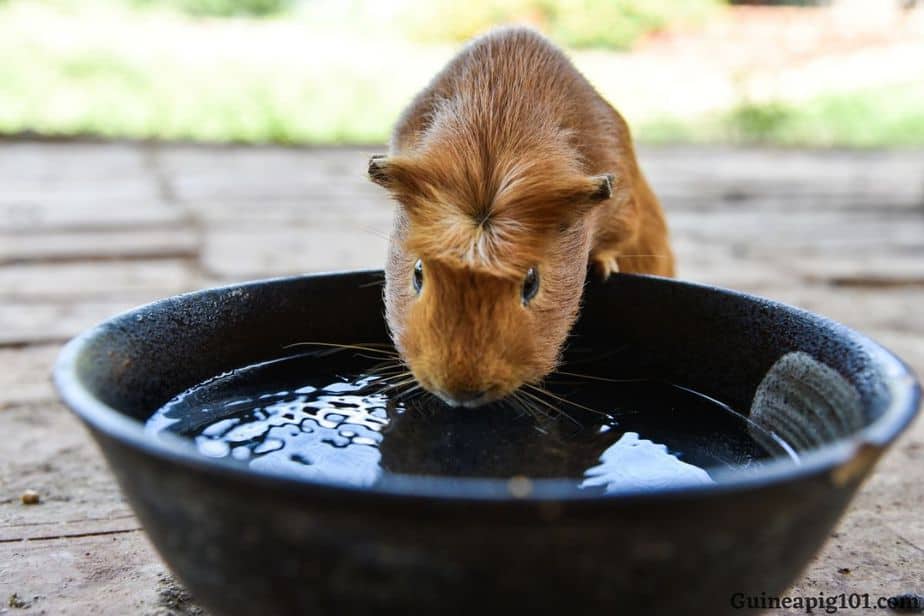
Many guinea pigs owners report the pass away of their guinea pigs in the heat due to lack of water.
You must ensure to keep your guinea pigs hydrated during warm summer days. Remember to provide clean and fresh drinking water to your guinea pigs throughout the day.
You must keep an eye on your piggy’s water bottle as heat causes water to evaporate rapidly. On particularly hot days, we will recommend you provide water in both a bowl and a bottle.
Some guinea pigs prefer to drink water in a bowl as compared to a bottle. You can also dip some ice cubes in their water to keep it cool. We will advise you to do this multiple times, especially when the temperature is high.
Misting your guinea pigs can cool them down
Misting your guinea pigs with water will help to keep them cool. For this, all you required is a clean, handheld spray bottle.
You can then mist your guinea pigs periodically, keeping in mind that you don’t drench their fur.
Some guinea pigs take the spraying of water well, while others may attempt to run away.
If your guinea pigs are running away, we will advise you to avoid misting as it can lead to unnecessary stress in your guinea pigs and make them feel hotter.
As guinea pigs don’t like getting wet, you must never soak them into water.
Your guinea pigs can even suffer from respiratory problems if you spray them too much with water. We will suggest you mist your guinea pigs only when it is needed.
Frozen water bottles/ice packs can help
If your guinea pigs do not enjoy misting, they may react well to a bottle of chilled water. You may see your guinea pig lie next to the container to keep themselves fresh.
Fill up a plastic bottle with water and freeze it properly. You must remember that the bigger the container, the better results it will give as the water in a 2-liter bottle will stay more cooling as compared to a 20-ounce bottle.
Frozen water melts in no time during summer. So you may have to freeze several bottles at a time and provide your guinea pigs with one daily.
Reduce handling your guinea pigs
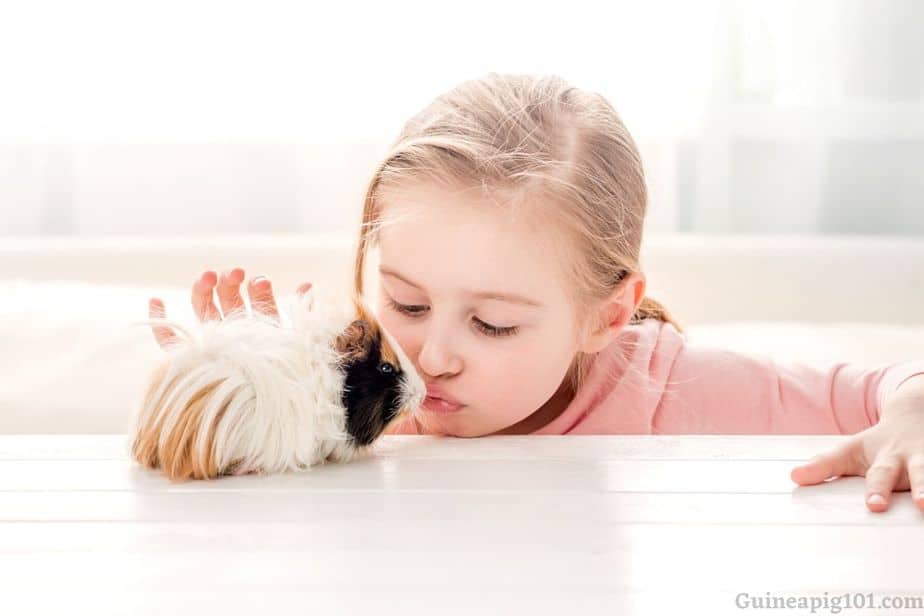
We will advise you not to handle your guinea pigs in the heat as it can increase their stress levels.
You must avoid handling your guinea pigs or reduce handling during summer, mainly because heat stress is already troubling them.
If you want to manage them, then the best time for this would be morning or evening when they can tolerate the temperatures.
Use a fan/air conditioner to keep the area cool
If you use a fan, it can help to create a flow of air to keep your guinea pigs cool. You should make sure that the fan does not blow directly on them.
You can also use an air conditioner if the temperature is too high to cool down your house or room where your piggie lives.
Cover the cage with a cool, damp towel
If you include the cage with a cool, wet cloth, it will help remove the excess heat from the cage and also serve as an extra layer of protection for the pen.
Switch on the fan to the wet towel’s direction, which will help to blow mild air inside their enclosure. You must consider a few things before you start doing so.
Make sure that you only cover a portion of the cage to allow for enough air exchange.
You must not cover the entire cage with a wet towel, as dripping water can soak them, making them fall sick.
Can guinea pigs have heat strokes?
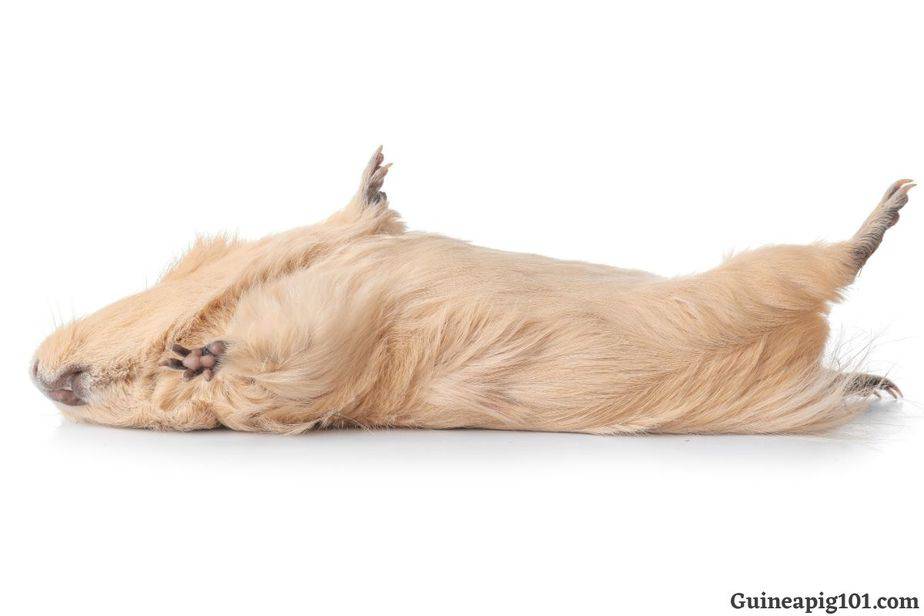
Guinea pigs have thick fur coats, and they lack effective cooling systems in their body. That is why they are highly susceptible to overheating.
Overheating or heat stroke in guinea pigs is called hyperthermia. Hyperthermia is much easier to prevent than to treat.
How do I know if my guinea pig is too hot?
Guinea pigs pant to release heat when they are dehydrated.
If the dehydration in guinea pigs becomes worse, than our guinea pigs will overheat and stop panting.
Let us discuss some of the symptoms of overheating in guinea pigs are as follows:
- Guinea pig’s ears and feet will turn warm.
- Loss of appetite
- Breathing fast
- Unresponsive and dull behavior
- Restlessness
- Breathing from mouth
- Awkward movement
- Discharge from nose and mouth.
- Collapse on their sides
- Seizures
You must remember that if the issue of overheating in your guinea pigs is not treaded quickly, then your guinea pigs may pass away.
How to treat heat stroke in guinea pigs?
If you notice your guinea pigs are too hot, act quickly to save it. You should immediately get in touch with your vet.
When you are getting ready, you should follow these steps to keep your guinea pigs calm, cool, and comfortable.
- Move your guinea pigs to a cool, well-ventilated place.
- You should spray cool water in your guinea pigs belly between their legs.
- You should damp your guinea pig’s ears and blow air over them by a fan or a hairdryer. Make sure that you do this in a cold setting.
If you notice your guinea pigs distressed, stop whatever you are doing immediately.
We would advise you not to dip your guinea pigs in cold water if they are overheated, as this can lead to shock.
How to prevent heat stroke in guinea pigs?
You should follow the following instructions to reduce your risk of guinea pigs overheating:
- Always keep your guinea pig’s environment between 16 to 21 degrees celsius.
- You must ensure that your guinea pigs can always move away from the sun and rest in a shaded, well-ventilated area in their cage.
- You should always provide enough access to drinkable water and water-rich fruits and vegetables.
- If your guinea pigs are overweight and hold a dense fur coat, we will advise you to trim their fur.
- You should always try to reduce the stress by not chasing your guinea pigs and reducing their exposure to predators and providing them with enough space to move around.
If the weather is especially hot, always consider the following strategies:
- Place your guinea pig’s cage to a cooler, more shaded, and better-ventilated place.
- Set up a portable fan that will blow air past your guinea pigs and not directly to them. You must avoid placing electrical cords within your guinea pigs reach as they love chewing. And if this happens, your guinea pigs can have significant health issues.
- Keep a large ceramic tile in your guinea pigs cage for your guinea pigs to rest on, and it also helps your guinea pigs to be cool.
- We will advise you to make cold packs by freezing 2-liter plastic bottles of water. Always remember to keep a bottle every day in your guinea pigs cage, mostly during the warmest part of the day.
- You must always mist your guinea pig’s ears with cold water systematically without drenching.
Old age, pregnancy underlying health conditions, and high humidity can lead to the risk of heart strokes in your guinea pigs.
We will advise you to be careful during such situations and keep an eye on your guinea pigs throughout a day.
Lastly, we would advise you to always take care of your guinea pigs by showing them all love and attention. Always try to keep them indoors during hot summer as they are not so good at tolerating heat.
Sources: American Journal of Physiology, The Physiological Society, Springerlink, Sciencedirect, Journal of general physiology, Management of skin conditions in guinea pigs, Care of guinea pigs, Guinea pig sweat gland.
